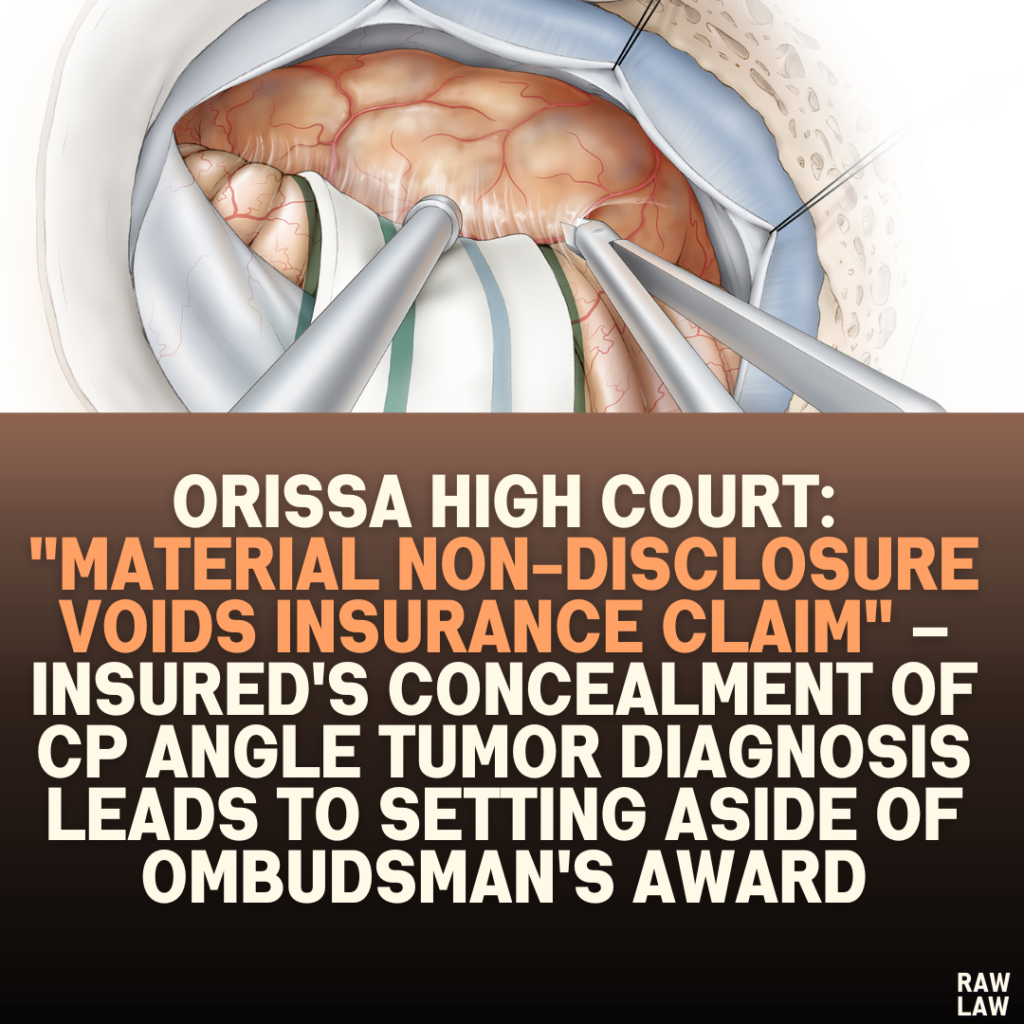Court’s Decision:
The Orissa High Court annulled the Insurance Ombudsman’s award, which had directed the insurance company to pay ₹10,00,000 to the insured. The court found that the insured had intentionally suppressed critical medical history, violating the doctrine of utmost good faith, an essential principle governing insurance contracts. It held that the Ombudsman’s award lacked proper examination of the evidence and failed to provide adequate reasoning.
The court directed the Ombudsman to reconsider the matter in light of the complete facts and evidence.
2. Facts of the Case:
- Insurance Policy and Proposal Form: The insured obtained a health insurance policy in February 2022. In her proposal form, she declared that she had no pre-existing medical conditions.
- Medical History: Contrary to her declarations, the insured had been diagnosed with a cerebellopontine angle tumor (CP Angle Tumor) in December 2021 and advised surgery by a neurosurgeon. She sought treatment for the tumor after obtaining the insurance policy, without disclosing her previous diagnosis.
- Insurance Claim: Following her surgery in June 2022, the insured submitted a claim for ₹10,00,000 under the policy. The insurer repudiated the claim on the grounds of material non-disclosure.
- Ombudsman’s Award: The Insurance Ombudsman ruled in favor of the insured, directing the insurer to pay ₹10,00,000. The Ombudsman reasoned that there was no evidence of a pre-existing condition.
- Insurer’s Writ Petition: The insurer filed a writ petition, challenging the Ombudsman’s award, citing fraud and suppression of facts by the insured.
3. Issues:
- Did the insured suppress material facts in the insurance proposal form?
- Did the Insurance Ombudsman properly examine and consider the evidence before issuing the award?
- Was the principle of utmost good faith (uberrima fides) breached by the insured?
4. Petitioner’s Arguments (Insurance Company):
- Fraud and Non-Disclosure: The insurer argued that the insured deliberately failed to disclose her pre-existing condition (diagnosed tumor) and the recommendation for surgery, as evidenced by medical records dated December 2021.
- Principle of Good Faith: The insurer emphasized the doctrine of uberrima fides, which mandates full and truthful disclosure by both parties in insurance contracts. The insured’s non-disclosure of material facts invalidated the policy.
- Erroneous Ombudsman Award: The Ombudsman overlooked documentary evidence of the insured’s medical history and relied solely on her declarations, ignoring discrepancies.
- Critical Evidence Ignored: The insurer cited medical records from December 2021, which showed that the insured had already been diagnosed and advised surgery. It also highlighted that a new hospital ID was created for the insured in June 2022, obscuring her medical history.
5. Respondent’s Arguments (Insured):
- No Pre-Existing Condition: The insured claimed that the tumor was diagnosed only in June 2022 after the policy was issued. She denied any knowledge of the condition during the policy proposal.
- Ombudsman’s Findings: The insured supported the Ombudsman’s conclusion that the insurer failed to substantiate its claims of non-disclosure with sufficient evidence.
6. Analysis of the Law:
Principle of Utmost Good Faith (Uberrima Fides):
- Insurance contracts require transparency and full disclosure of material facts by both parties.
- Failure to disclose relevant facts (e.g., medical history) constitutes fraud and can void the insurance contract.
Insurance Ombudsman Rules, 2017:
- Rule 13: Ombudsman must fairly examine all complaints and evidence regarding disputes between insurers and policyholders.
- Rule 15: Ombudsman must act impartially, equitably, and transparently when resolving disputes.
- Rule 17: Ombudsman’s award must be reasoned and based on evidence, providing clear justifications for conclusions.
Judicial Precedents:
The court referred to T. Takano v. SEBI and Steel Authority of India v. Sales Tax Officer, reiterating the need for:
- Disclosure of all relevant evidence to ensure fairness.
- Reasoned decisions by quasi-judicial authorities.
- Proper adjudication of facts and adherence to natural justice.
7. Precedent Analysis:
- T. Takano v. SEBI: Established that failure to disclose material facts renders a decision invalid due to procedural unfairness.
- Steel Authority of India v. Sales Tax Officer: Highlighted that decisions without reasoning are arbitrary and cannot stand.
8. Court’s Reasoning:
- Non-Disclosure of Medical History:
- Medical records from December 2021 clearly indicated that the insured was diagnosed with a CP Angle Tumor and advised surgery before obtaining the policy.
- The insured deliberately concealed this information in the proposal form, violating the principle of utmost good faith.
- Errors in Ombudsman’s Findings:
- The Ombudsman concluded that the disease was diagnosed only in June 2022, based on incomplete and incorrect information.
- The Ombudsman failed to critically examine evidence, including hospital records showing two distinct IDs for the insured, indicating an attempt to suppress prior medical history.
- Flawed Reasoning in Award:
- The Ombudsman did not provide a detailed analysis or reasoning for rejecting the insurer’s evidence.
- The award relied heavily on the insured’s self-serving statements, ignoring contradictory documentary evidence.
- Role of the Ombudsman:
- The court observed that the Ombudsman’s primary duty is to adjudicate disputes based on evidence and reasoned findings. In this case, the Ombudsman failed to fulfill this obligation.
9. Conclusion:
The High Court set aside the Ombudsman’s award, holding that:
- The insured’s non-disclosure of her medical history constituted fraud.
- The Ombudsman’s decision was procedurally flawed and lacked proper reasoning.
The court remanded the matter to the Ombudsman for fresh consideration, directing that all evidence, including hospital records, be critically analyzed.
10. Implications:
- For Insurers: Reinforces the right to reject claims based on fraud and non-disclosure, protecting the principle of utmost good faith.
- For Policyholders: Highlights the importance of full and honest disclosure when applying for insurance.
- For Quasi-Judicial Authorities: Emphasizes the need for reasoned decisions based on thorough examination of evidence.




Pingback: Sikkim High Court Rules: "Touching a Minor's Left Breast in a Taxi Indicates Sexual Intent; Conviction Under POCSO Act and IPC Upheld" - Raw Law